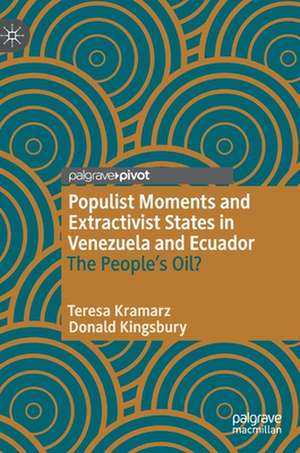Populist Moments and Extractivist States in Venezuela and Ecuador: The People’s Oil?
Autor Teresa Kramarz, Donald Kingsburyen Limba Engleză Hardback – 8 iun 2021
Preț: 483.70 lei
Nou
Puncte Express: 726
Preț estimativ în valută:
92.56€ • 100.85$ • 77.99£
92.56€ • 100.85$ • 77.99£
Carte tipărită la comandă
Livrare economică 23 aprilie-07 mai
Preluare comenzi: 021 569.72.76
Specificații
ISBN-13: 9783030709624
ISBN-10: 3030709620
Pagini: 118
Ilustrații: XXI, 118 p. 6 illus., 5 illus. in color.
Dimensiuni: 148 x 210 mm
Greutate: 0.32 kg
Ediția:1st ed. 2021
Editura: Springer International Publishing
Colecția Palgrave Macmillan
Locul publicării:Cham, Switzerland
ISBN-10: 3030709620
Pagini: 118
Ilustrații: XXI, 118 p. 6 illus., 5 illus. in color.
Dimensiuni: 148 x 210 mm
Greutate: 0.32 kg
Ediția:1st ed. 2021
Editura: Springer International Publishing
Colecția Palgrave Macmillan
Locul publicării:Cham, Switzerland
Cuprins
Chapter 1: The People’s Oil?.- Chapter 2: The Limits of Populism as Causal Explanation.- Chapter 3: The Self.-Reinforcing Effects of the Extractive State.- Chapter 4: “The Devil’s Excrement”: Venezuela as the Prototypical Extractive State.- Chapter 5: The Citizen’s Revolution and the Failure of an Alternative Environmental Moment in Ecuador.- Chapter 6: Extractive States and Prospects for Environmental Action.
Notă biografică
Teresa Kramarz is Associate Professor in Global Affairs at the University of Toronto, Canada.
Donald V Kingsbury is Assistant Professor in Latin American Studies and Political Science at the University of Toronto, Canada.
Donald V Kingsbury is Assistant Professor in Latin American Studies and Political Science at the University of Toronto, Canada.
Textul de pe ultima copertă
“Few issues have perplexed scholars and practitioners of Latin American politics like the rise of leftwing populism. In this book Kramarz and Kingsbury provide a compelling account of how and why fossil fuels have come to dominate nationalist priorities and political possibilities in Ecuador and Venezuela. Essential reading for anyone interested in Latin American politics and development.”
—Craig Johnson, Professor and Director, Guelph Institute of Development Studies, University of Guelph, Canada
“This book conjoins a theoretical discussion about the intimate and reinforcing relationship between extractivism and populism with a novel description of how these themes have affected Ecuador and Venezuela. It is an engaging book and very useful contribution.”
—Craig Johnson, Professor and Director, Guelph Institute of Development Studies, University of Guelph, Canada
“This book conjoins a theoretical discussion about the intimate and reinforcing relationship between extractivism and populism with a novel description of how these themes have affected Ecuador and Venezuela. It is an engaging book and very useful contribution.”
—Scott Morgenstern, Professor of Political Science and Director of Pitt’s Center for Latin American Studies, University of Pittsburgh, USA
Thisbook addresses the intersection of extractivism, populism, and accountability. Although populist politics are often portrayed as a driver of poor environmental governance, Populist Moments and Extractivist States identifies it as an intervening variable at best – one that emerges in response to the accountability deficits of extractive states. Case studies in Venezuela – for many, the prototypical petrostate – and Ecuador – which exchanged agribusiness dependency for oil decades later – illustrate how extractive states are oriented by a colonial logic of export and service. This logic regulates state-society-nature relationships and circumscribes avenues for local stakeholders to hold public officials and extractive industries to account for environmental and human harms. Populist moments of the early 21st century across Latin America responded to these conditions, promising more equitable and sustainable futures. However, rather than reversing the technocracy, verticalism, and exclusion of the recent past, populist moments often intensified and legitimated them in the drive to maximize and distribute resource rents. The result has been cyclical, as populist moments of hope and rupture fall prey to the extractivist states they tried, and failed, to replace.
Teresa Kramarz is Associate Professor in Global Affairs at the University of Toronto, Canada.
Donald V Kingsbury is Assistant Professor in Latin American Studies and Political Science at the University of Toronto, Canada.
Thisbook addresses the intersection of extractivism, populism, and accountability. Although populist politics are often portrayed as a driver of poor environmental governance, Populist Moments and Extractivist States identifies it as an intervening variable at best – one that emerges in response to the accountability deficits of extractive states. Case studies in Venezuela – for many, the prototypical petrostate – and Ecuador – which exchanged agribusiness dependency for oil decades later – illustrate how extractive states are oriented by a colonial logic of export and service. This logic regulates state-society-nature relationships and circumscribes avenues for local stakeholders to hold public officials and extractive industries to account for environmental and human harms. Populist moments of the early 21st century across Latin America responded to these conditions, promising more equitable and sustainable futures. However, rather than reversing the technocracy, verticalism, and exclusion of the recent past, populist moments often intensified and legitimated them in the drive to maximize and distribute resource rents. The result has been cyclical, as populist moments of hope and rupture fall prey to the extractivist states they tried, and failed, to replace.
Teresa Kramarz is Associate Professor in Global Affairs at the University of Toronto, Canada.
Donald V Kingsbury is Assistant Professor in Latin American Studies and Political Science at the University of Toronto, Canada.
Caracteristici
Highlights structural conditions associated with Latin American petrostates that trigger populist reactions to exclusionary politics and endure beyond the ruptures associated with populism Considers populism as response to the democratic accountability deficits that characterize extractive states Illustrates the degree to which petrostates are led by a colonial and export-oriented logic
